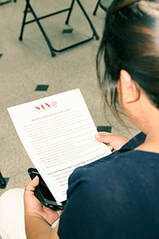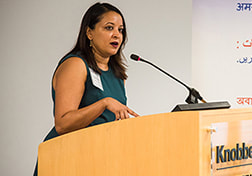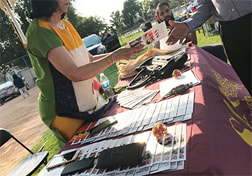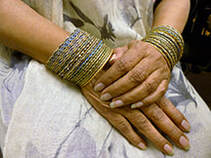BY KALAYANI VASAN
LOS ANGELES, CA - Founded in 1990, South Asian Network is a community based organization advancing the health, well - being and civil rights of South Asians in Southern California. ‘SAN’ as it is popularly known has become best known for its anti-sexual assault campaigns and the flagship progress made as the...
LOS ANGELES, CA - Founded in 1990, South Asian Network is a community based organization advancing the health, well - being and civil rights of South Asians in Southern California. ‘SAN’ as it is popularly known has become best known for its anti-sexual assault campaigns and the flagship progress made as the...

singular-most reliable, ‘go to’ resource for women survivors of non-consensual sex and domestic violence. Staffed with case managers who speak English, Hindi, Urdu, Bangla, Nepali and even Spanish, SAN is a bastion of solace and even life-saving resource to those who have faced sexual violence at one time or another in their lives. SAN’s program –AWAZ–Voices against Violence.
SAN Executive Director, Shikha Bhatnagar spoke to IJ :
Q: What percentage of sexual assault victims seeks help with SAN?
A: It is hard to give a number or percentage as the data is very limited but, 99% of those who approach us are South Asian.
Q: What does your portfolio of services offer?
A: We provide safety and long term recovery services, immediate crisis services, case management services, advocacy counseling, transportation support, help with applying for public benefits and accessing medical and legal services that are offered through a community of attorneys who volunteer their services.
Q: Is there a stigma associated with sexual assault and domestic violence within the South Asian community?
A: Yes. These issues are still very much swept under the rug; many members of our community don’t believe that it is as big an issue as it actually is. We published some ads in a local newspaper and we received feedback questioning if it is actually as big of a problem as we implied that it is. This shows that there is a need for creating awareness on these issues and that we are not exempt from these issues. Yes, the’ Me Too’ movement has shed a lot of light on this and what we try to do is to remind the community that for those who live in fear it is important that we bring it out of the shadows.
Q: What percentage of survivors are married? What support would you be able to give those who are pregnant as a result of rape?
A: According to our data gathered from 2015, 82% were or are married. We have not had any instance so far of a pregnant sexual assault survivor; however if this were the case we would offer medical, emotional and legal support, get them social benefits based on their eligibility and maternity classes if they decide to keep the baby.
Q: Is there a concentration of victims in a subsection of our community?
A: Assault incidents are not based on certain socio-economic areas, particular communities or faith groups, it is widespread. What we do see is that our language services encourage more people from that community to come in for support. So, if you speak a language other than what we currently offer, please volunteer as a translator. You could be saving a life.
Q: Do you have cases where a survivor will not come forward whole heartedly due to being financially dependent or due to ‘immigration dependency’ on the perpetuator?
A: Yes. A number of factors that go into a survivor’s profile need to be addressed-what it comes down to is a power dynamic wherein the perpetrator has the advantage due to financial, social and or paternal factors. We also have situations wherein the survivor will tolerate the abuse until the children are grown before they proceed with the divorce process. There also is the issue when survivors do not come forward as they feel they will not be believed.
Q: How is SAN structured? What are its future plans?
A: We are unique in that we are able to provide so many services under one roof. For example someone may come in for citizenship application assistance and may also need health insurance; our program associates can help them with that. Our specialized holistic support to the community is rendered in a culturally, linguistic-specific way; as we approach our 30th anniversary we realize that the greater Los Angeles area is so widespread that we need to increase our capacity to reach various pockets of our community. We have been providing ad hoc support to survivors who need housing or economic assistance. Launching an economic justice unit will become our 4th pillar:
Civil Rights unit, 2.CRI unit, 3.AWAZ program and the 4.Economic Justice unit will complete us. We encourage the community to support our efforts by visiting our website: southasiannetwork.org and select the ‘Donate’ link. Your gift will go towards providing life-saving assistance to South Asians in the greater Los Angeles area.
SAN Executive Director, Shikha Bhatnagar spoke to IJ :
Q: What percentage of sexual assault victims seeks help with SAN?
A: It is hard to give a number or percentage as the data is very limited but, 99% of those who approach us are South Asian.
Q: What does your portfolio of services offer?
A: We provide safety and long term recovery services, immediate crisis services, case management services, advocacy counseling, transportation support, help with applying for public benefits and accessing medical and legal services that are offered through a community of attorneys who volunteer their services.
Q: Is there a stigma associated with sexual assault and domestic violence within the South Asian community?
A: Yes. These issues are still very much swept under the rug; many members of our community don’t believe that it is as big an issue as it actually is. We published some ads in a local newspaper and we received feedback questioning if it is actually as big of a problem as we implied that it is. This shows that there is a need for creating awareness on these issues and that we are not exempt from these issues. Yes, the’ Me Too’ movement has shed a lot of light on this and what we try to do is to remind the community that for those who live in fear it is important that we bring it out of the shadows.
Q: What percentage of survivors are married? What support would you be able to give those who are pregnant as a result of rape?
A: According to our data gathered from 2015, 82% were or are married. We have not had any instance so far of a pregnant sexual assault survivor; however if this were the case we would offer medical, emotional and legal support, get them social benefits based on their eligibility and maternity classes if they decide to keep the baby.
Q: Is there a concentration of victims in a subsection of our community?
A: Assault incidents are not based on certain socio-economic areas, particular communities or faith groups, it is widespread. What we do see is that our language services encourage more people from that community to come in for support. So, if you speak a language other than what we currently offer, please volunteer as a translator. You could be saving a life.
Q: Do you have cases where a survivor will not come forward whole heartedly due to being financially dependent or due to ‘immigration dependency’ on the perpetuator?
A: Yes. A number of factors that go into a survivor’s profile need to be addressed-what it comes down to is a power dynamic wherein the perpetrator has the advantage due to financial, social and or paternal factors. We also have situations wherein the survivor will tolerate the abuse until the children are grown before they proceed with the divorce process. There also is the issue when survivors do not come forward as they feel they will not be believed.
Q: How is SAN structured? What are its future plans?
A: We are unique in that we are able to provide so many services under one roof. For example someone may come in for citizenship application assistance and may also need health insurance; our program associates can help them with that. Our specialized holistic support to the community is rendered in a culturally, linguistic-specific way; as we approach our 30th anniversary we realize that the greater Los Angeles area is so widespread that we need to increase our capacity to reach various pockets of our community. We have been providing ad hoc support to survivors who need housing or economic assistance. Launching an economic justice unit will become our 4th pillar:
Civil Rights unit, 2.CRI unit, 3.AWAZ program and the 4.Economic Justice unit will complete us. We encourage the community to support our efforts by visiting our website: southasiannetwork.org and select the ‘Donate’ link. Your gift will go towards providing life-saving assistance to South Asians in the greater Los Angeles area.




 RSS Feed
RSS Feed
